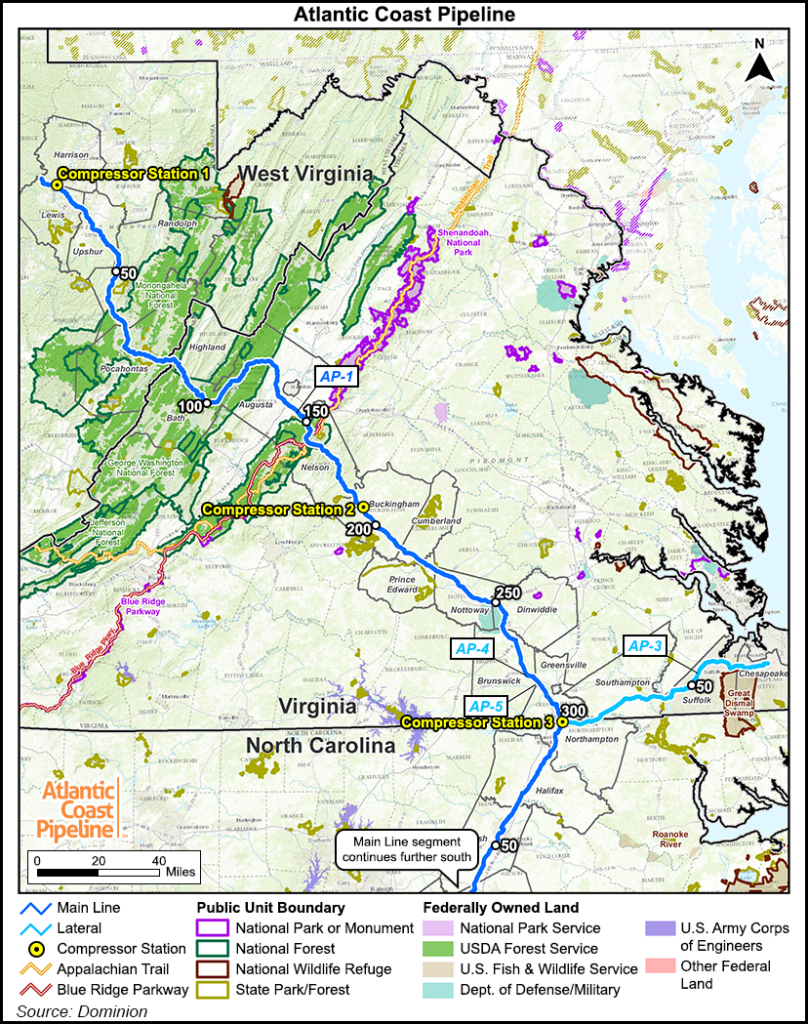Infrastructure | E&P | Marcellus | NGI All News Access | NGI The Weekly Gas Market Report | Utica Shale
Atlantic Coast Water Crossing Permit Holds Up as Court Denies Enviro Challenge
A federal appeals court has shut down an effort by environmental groups to stall Atlantic Coast Pipeline LLC’s (ACP) construction plans over a condition in its West Virginia water crossing permit, a tactic that had more success against the Mountain Valley Pipeline (MVP).

The U.S. Court of Appeals for the Fourth Circuit, which has handed down its fair share of unfavorable rulings to ACP and MVP in recent months, last Thursday denied without prejudice a motion filed by the Sierra Club and other groups to stay ACP’s Nationwide Permit (NWP) 12. The NWP 12 covers waterbody crossings and is issued by the U.S. Army Corps of Engineers under Section 404 of the U.S. Clean Water Act.
The Fourth Circuit had previously granted a stay of the similarly routed MVP’s NWP 12, determining that the project could not meet a condition in its permit in West Virginia that stipulated all stream crossings be constructed within 72 hours.
Environmental groups quickly adopted the same tactic in challenging ACP, but their argument that ACP couldn’t complete a planned crossing of the Greenbrier River in 72 hours did not persuade the court.
“The record lacks clear evidence that ACP is unable to comply with the 72-hour condition,” the court concluded. In addition, the Huntington District of the Army Corps “has voluntarily suspended all NWP 12 verifications for ACP in West Virginia pending ACP’s provision of additional information to ensure its compliance with all NWP 12 conditions.”
The court also cited a commitment from ACP to provide written notice to the petitioners in advance of resuming any work authorized under the NWP 12.
Even with the recent favorable ruling, it’s hardly smooth regulatory sailing from here for ACP. Earlier this month, FERC ordered a halt to construction along the entire 600-mile project route after the Fourth Circuit vacated key federal approvals from the National Park Service and the U.S. Fish and Wildlife Service.
ACP has pushed the Federal Energy Regulatory Commission to allow construction to continue on segments said to be unaffected by the appeals court decisions. In the meantime, the Commission has approved plans to stabilize work areas along the ACP and related Supply Header Project routes, including completing some construction activities that were already in progress.
ACP spokesman Aaron Ruby said the Fourth Circuit’s decision to deny a stay of the NWP 12 is a “positive development” for the project.
“We remain fully committed to the 72-hour time limit for stream and river crossings…just a few weeks ago we requested and the Army Corps granted a temporary suspension of our permit so the agency could ensure compliance with the 72-hour requirement,” Ruby said. “We’re working with the agency to resolve this issue promptly so our permit can be reinstated.
“…We’re also working closely with the Fish & Wildlife Service and National Park Service to resolve the issues in FERC’s stop work order so we can resume construction as soon as possible. We’re confident the agencies will reissue their authorizations very soon, which would allow full construction to resume without significant delay to the project.”
MVP, meanwhile, also received a stop work order from FERC resulting from unfavorable Fourth Circuit decisions. FERC has since authorized construction to resume on about 77 miles in West Virginia that would allow an incremental 1 Bcf/d of service to Columbia Gas Transmission’s WB Interconnect.
Both ACP and MVP propose routes that cut through environmentally sensitive terrain along the West Virginia/Virginia border to deliver Marcellus and Utica shale gas into Southeast and Mid-Atlantic markets. The projects have faced scrutiny at FERC over their similarities.
The 1.5 Bcf/d ACP, with a targeted late 2019 in-service date, is a joint venture (JV) of Dominion Energy Inc., Duke Energy Corp., Piedmont Natural Gas and Southern Company Gas.
The 300-mile, 2 million Dth/d MVP is a JV of EQT Midstream Partners LP, NextEra US Gas Assets LLC, Con Edison Transmission Inc., WGL Midstream and RGC Midstream LLC. MVP’s target start date was recently pushed back from 1Q2019 to 4Q2019.
© 2024 Natural Gas Intelligence. All rights reserved.
ISSN © 2577-9877 | ISSN © 1532-1266 | ISSN © 2158-8023 |
